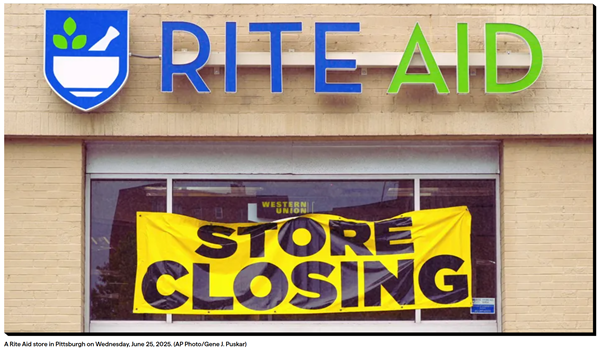Cannibalism At The Pharmacy Counter
By Veronica Riccobene
August 29, 2025
 Just days after CVS Caremark was slapped with a $290 million fine for defrauding Medicare, bankruptcy trustees representing Rite Aid sued the pharmacy benefit manager for nearly twice that amount for allegedly operating an unlawful and anticompetitive prescription drug profit “scheme.” The new complaint filed this month asserts that CVS Caremark “devastated” Rite Aid by overcharging an estimated $500 million in fraudulent “clawback” penalties — fees that CVS Caremark demanded long after drug prescriptions were filled.
Just days after CVS Caremark was slapped with a $290 million fine for defrauding Medicare, bankruptcy trustees representing Rite Aid sued the pharmacy benefit manager for nearly twice that amount for allegedly operating an unlawful and anticompetitive prescription drug profit “scheme.” The new complaint filed this month asserts that CVS Caremark “devastated” Rite Aid by overcharging an estimated $500 million in fraudulent “clawback” penalties — fees that CVS Caremark demanded long after drug prescriptions were filled.
This comes as Rite Aid, once the third-largest pharmacy chain in the United States, is being stripped for parts in bankruptcy court and sold to its competitors, including CVS Health — the $90 billion health care behemoth that operates more than 9,000 retail pharmacies as well as CVS Caremark and the insurance giant Aetna.
The lawsuit suggests that CVS Health exploited its market control to deliberately undercut a competitor pharmacy — and then later acquired Rite Aid’s remains, further consolidating its power to raise drug prices for millions of Americans.
Pharmacy benefit managers serve as intermediaries between drug manufacturers, health insurers, and pharmacies, determining which prescription drugs insurers will cover and how much they will cost. Just three pharmacy benefit managers — owned by CVS Health, UnitedHealth Group, and Cigna — currently control 80 percent of all U.S. drug sales, generating billions of dollars in profits by keeping drug prices high and reimbursement rates low.
The “Big Three” pharmacy benefit managers are currently facing a separate federal antitrust investigation into their anticompetitive billing practices, as well as a recently widened Congressional probe.
In the newly filed suit, Rite Aid’s attorneys point to retroactive “direct and indirect remuneration” fees, or DIR fees — penalties that pharmacy benefit managers impose based on a pharmacy’s performance. Between 2010 and 2020, DIR fees grew by more than 107,400 percent, leading Medicare regulators to ban the retroactive clawback practice, effective in 2024. Regulators predict the ban will reduce Medicare beneficiaries’ out-of-pocket prescription drug costs by $21.3 billion over the next decade.
According to Rite Aid’s recent bankruptcy filings, CVS Caremark imposed increasingly steep and opaque clawback fees over the last six years, “crippling” Rite Aid’s business and forcing pharmacy closures at providers’ and patients’ expense. The new lawsuit further claims that CVS Caremark levied these fees in cases where physicians prescribed medications not preferred by the pharmacy benefit manager, as well as when patients failed to submit refill requests “consistently and quickly” enough.
The complaint also alleges that…
[READ THE COMPLETE ARTICLE HERE]
